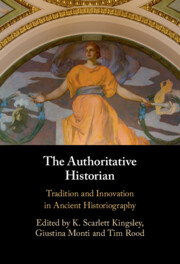Book contents
- The Authoritative Historian
- The Authoritative Historian
- Copyright page
- Dedication
- Contents
- Contributors
- Preface
- Abbreviations
- Introduction
- Part I Myth, Fiction, and the Historian’s Authority
- Part II Dislocating Authority in Herodotus’ Histories
- Part III Performing Collective and Personal Authority
- Chapter 9 Singing and Dancing Pindar’s Authority
- Chapter 10 Authority, Experience, and the Vicarious Traveller in Herodotus’ Histories
- Chapter 11 Veni, vidi, vici
- Chapter 12 Self-Praise and Self-Presentation in Plutarch
- Part IV Generic Transformations
- Part V Innovation within Tradition
- Bibliography
- Index Locorum
- General Index
Chapter 12 - Self-Praise and Self-Presentation in Plutarch
from Part III - Performing Collective and Personal Authority
Published online by Cambridge University Press: 02 December 2022
- The Authoritative Historian
- The Authoritative Historian
- Copyright page
- Dedication
- Contents
- Contributors
- Preface
- Abbreviations
- Introduction
- Part I Myth, Fiction, and the Historian’s Authority
- Part II Dislocating Authority in Herodotus’ Histories
- Part III Performing Collective and Personal Authority
- Chapter 9 Singing and Dancing Pindar’s Authority
- Chapter 10 Authority, Experience, and the Vicarious Traveller in Herodotus’ Histories
- Chapter 11 Veni, vidi, vici
- Chapter 12 Self-Praise and Self-Presentation in Plutarch
- Part IV Generic Transformations
- Part V Innovation within Tradition
- Bibliography
- Index Locorum
- General Index
Summary
In Authority and Tradition in Ancient Historiography, his influential work of 1997, John Marincola examined various ways in which historians used tradition to claim and bolster their own authority, identifying five specific techniques: (1) reference to ‘gods and fortune’, (2) a ‘pretence of necessity’, (3) ‘commonness of action’, (4) ‘praise in the mouth of others’, and finally (5) ‘magnification of actions’. The dust jacket of the original volume features busts of Herodotus and Thucydides, fine historians both. As a biographer, Plutarch is not in the same league, but nevertheless he appears in the index locorum a satisfying thirty-seven times thanks to Marincola’s own authoritative and expansive view of historiography. About one third of Marincola’s Plutarch citations are to the Lives, and the rest to the Moralia, with the majority from De se ipsum citra invidiam laudando (hereafter De se laudando), the work that most Plutarchan scholars consult for Plutarch’s view on self-presentation in the form of praise. In that essay, Plutarch gives us multiple situations when it is appropriate to praise oneself, and various techniques to avoid incurring ill will while doing so since self-praise is a tricky thing. Marincola sums up Plutarch’s advice in De se laudando as ‘praise the audience too (542a–b), ascribe some success to chance or god (542e–f), use slight corrections or amendments (ἐπανορθώσεσι) to others’ praise of you (543a–b), throw in some shortcomings (543f)’.
Information
- Type
- Chapter
- Information
- The Authoritative HistorianTradition and Innovation in Ancient Historiography, pp. 241 - 258Publisher: Cambridge University PressPrint publication year: 2023
